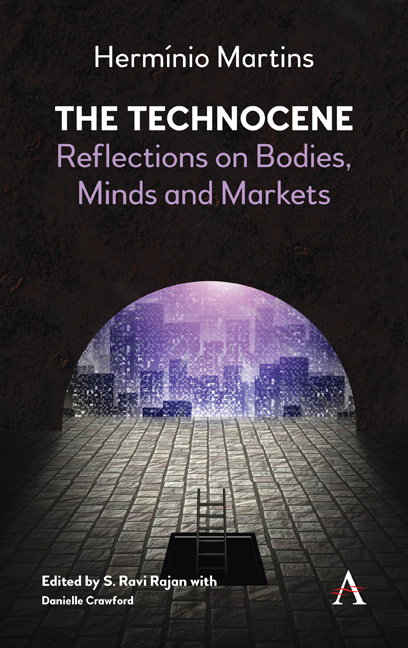Book contents
- Frontmatter
- Dedication
- Contents
- Preface
- Editor's Introduction: Hermínio Martins and the Technocene
- Chapter One The Technocene: On Bodies, Minds and Markets
- Chapter Two Technology Sublime: Paths to the Post-Human
- Chapter Three Perpetual Augmentation: From Eugenics to Human Genetic Capitalism
- Chapter Four The Body Vanishes! Momenta of Discarnation in Technoscience Today
- Chapter Five When Universities Become Body-Shops
- References
- Index
Chapter Three - Perpetual Augmentation: From Eugenics to Human Genetic Capitalism
Published online by Cambridge University Press: 12 February 2019
- Frontmatter
- Dedication
- Contents
- Preface
- Editor's Introduction: Hermínio Martins and the Technocene
- Chapter One The Technocene: On Bodies, Minds and Markets
- Chapter Two Technology Sublime: Paths to the Post-Human
- Chapter Three Perpetual Augmentation: From Eugenics to Human Genetic Capitalism
- Chapter Four The Body Vanishes! Momenta of Discarnation in Technoscience Today
- Chapter Five When Universities Become Body-Shops
- References
- Index
Summary
Should the question of human reproductive cloning be relegated to the realm of techno-futurology if not techno-fantasy, beyond the purview of ethics, or is it amenable to some kind of serious philosophical reflection? The question has been addressed at some length by philosophers of morality, of law, of biology, of technology, as well as theologians, for some time. Already in the 1970s, thinkers of the stature of Hans Jonas had addressed the great width and depth of implications of the matter, and of course in the last few years, after the Dolly landmark in 1996, the pace of pertinent publications has accelerated, and numerous publications and collections of papers have appeared by serious scholars in a variety of disciplines in a number of countries. Human reproductive cloning (HRC) has not yet come to pass, as far as is known to the world, but there is already a corpus of thoughtful writing on the matter, as well as, to be sure, much facile – even ribald – comment from people who ought to have known better. By contrast, animal cloning, reproductive or therapeutic, has received little formal philosophical attention, and the ethical or other value issues raised by human therapeutic cloning, although addressed and referred to in the press, have been, perhaps rightly, overshadowed by those of HRC.
HRC is most obviously assigned to the genus ‘reproductive technologies’, or ‘new reproductive technologies’, which has expanded considerably in range, sophistication and deployment in the last three or four decades, though it surely constitutes a distinct species within this genus, at the very least. It is at least problematical that the social, ethical, axiological, metaphysical implications of this potential new species of human reproductive technologies can simply be regarded as perfectly continuous with the previous or current technologies of medically assisted reproduction (IVF) or ART, that have been implemented and accepted so far in the West. However, it should be noted that conventional bioethics restricts itself to ethical issues without much if any consideration of total axiological and, more broadly, ‘evaluative-metaphysical’ implications regarding especially the metaphysical status of the human person and the ontology of persons-insociety.
- Type
- Chapter
- Information
- The TechnoceneThe Technocene Reflections on Bodies, Minds and Markets, pp. 89 - 130Publisher: Anthem PressPrint publication year: 2018

